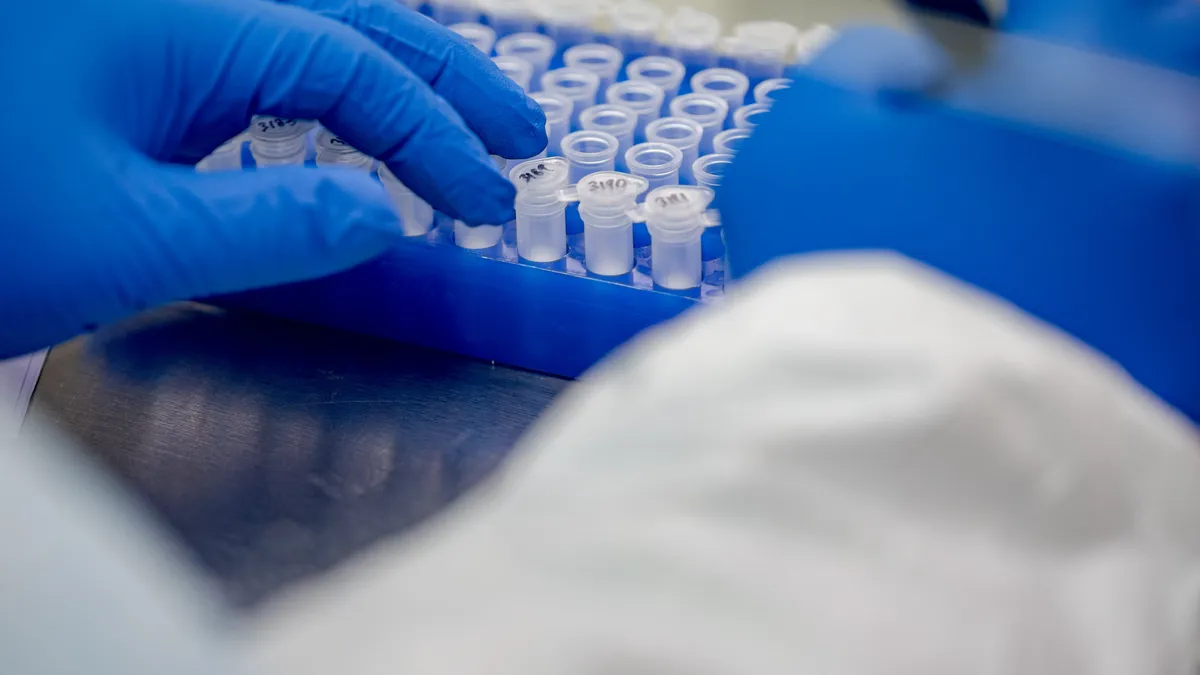Dive Brief:
- LabCorp Monday announced its COVID-19 antibody tests will be available nationwide with no out-of-pocket costs with an order from a healthcare provider. The test will be administered at its nearly 2,000 patient service centers, more than 100 of which are at Walgreens locations, as well as doctors’ offices.
- Quest Diagnostics on Tuesday said it's now offering a consumer-initiated service that is "self pay" and costs $119 plus a blood draw fee. The antibody test is requested online by a consumer, which must be approved by a physician for an appointment to be scheduled for a blood draw at one of the company's 2,200 patient service centers. That builds on efforts announced last week making antibody testing available via healthcare providers.
- Execs from the two biggest commercial labs were at the White House Monday for the rollout of the Trump administration's testing blueprint to reopen the country. The plan relies on antibody tests to help identify Americans who have been infected with the virus and may have developed immunity. At the same time, the administration is still exploring how the accuracy of these tests can be improved.
Dive Insight:
The expansion of antibody testing on a national scale by LabCorp and Quest comes amid growing demand for the blood tests as the federal government and states try to decide how to safely reopen the country ravaged by the coronavirus outbreak.
LabCorp, which has been offering antibody tests on a limited basis to healthcare systems since late March, last week announced ramping up of testing to be able to perform several hundred thousand tests per week by mid-May. Currently, the company has capacity to perform about 50,000 antibody tests per day, an amount it expects will quadruple by mid-May.
Pharmacy chain Walgreens announced on Monday plans to triple its current coronavirus testing capacity by leveraging both LabCorp’s COVID-19 nasal swab diagnostic test and antibody blood testing at more than 100 LabCorp at Walgreens patient centers.
For its part, Quest announced last week that it began conducting antibody testing and expects to perform more than 200,000 tests per day by mid-May. Quest CEO Steve Rusckowski said at Monday's briefing that his company will deliver "quality" antibody tests combined with convenience through QuestDirect, its consumer-initiated testing business, with post-test telehealth support.
But despite the White House touting the value of serology tests for reopening the country, the administration's new testing blueprint acknowledges that antibody testing is an area of "ongoing inquiry" and concern.
"Highly specific and sensitive antibody tests will enable a better understanding of the spread of the virus and identify those who have already been infected. These tests, however, must be very accurate and reliable to guard against false positives, which can lead people to incorrectly believe they had the virus and may be immune from further infection," according to the White House plan.
The serology tests are generally designed to detect the antibody IgG, a protein produced later in the course of infection, or the antibody IgM, which may indicate a person's more recent exposure to the virus. Some tests screen for both.
White House officials indicated testing for both antibodies is important. The plan said the administration is "exploring how accuracy and reliability of antibody tests can be improved through the aggregation of two successive tests under certain circumstances."
Cowen analysts said in a note to clients Tuesday they expect there to be enough testing capacity to implement population-wide antibody screening. But the firm said its volume projections only assume one antibody test per person and that requiring two tests would "represent upside" to its forecast.
Autobio Diagnostics, Cellex, and Chembio Diagnostic System are the only companies to have so far receive emergency use authorizations from the FDA for serology tests that test for both the IgG and IgM antibodies.
Ultimately, however, the White House plan on roles and responsibilities of the federal and state governments contends it is the responsibility of states and labs to validate the tests not authorized by FDA.
The FDA last month provided regulatory flexibility for antibody tests to provide labs and healthcare providers with "early access" to these products with the proviso that the FDA had not reviewed or authorized them, and that they should not be used for diagnosing or excluding active SARS-CoV-2 infection.
Abbott and DiaSorin are the latest medtechs to receive FDA emergency use authorizations for antibody tests. But other major companies such as BD and smaller ones as well have launched similar tests without the designation under the agency's policy unique to the COVID-19 public health emergency.
A House subcommittee on Friday found FDA is unable to validate the accuracy of antibody tests already on the market. The report said also that "companies are ignoring requests from the Department of Health and Human Services to voluntarily submit their tests for validation."











